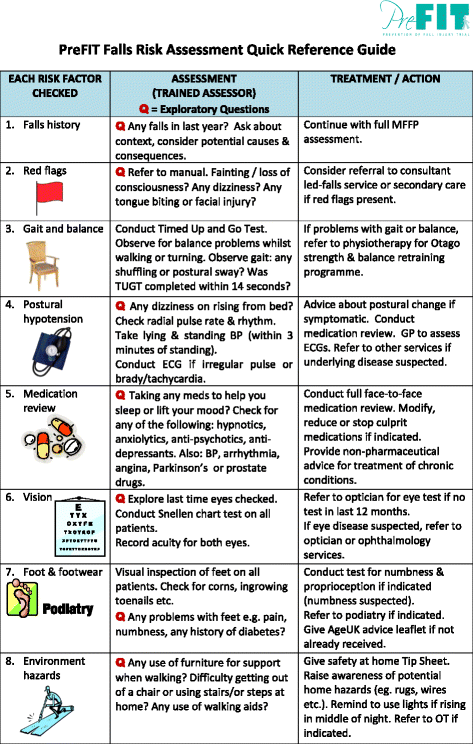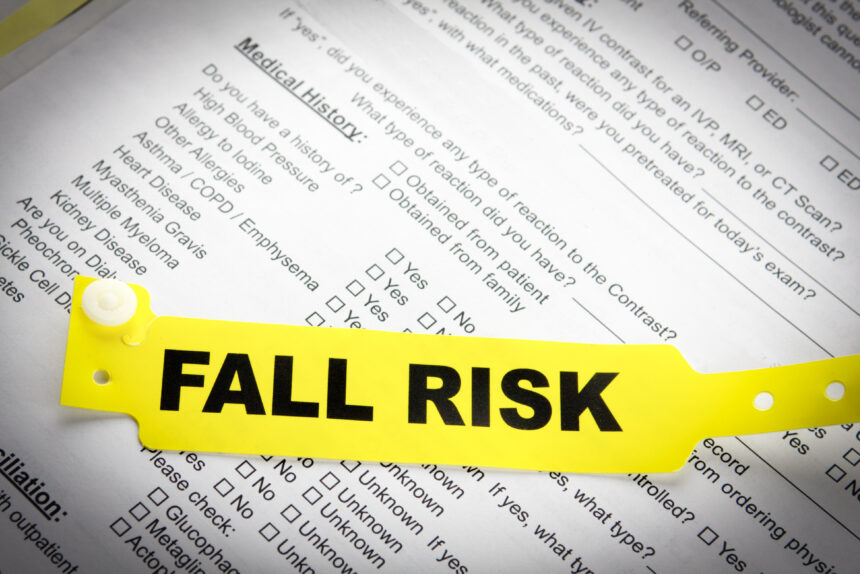A Biased View of Dementia Fall Risk
A Biased View of Dementia Fall Risk
Blog Article
Not known Factual Statements About Dementia Fall Risk
Table of ContentsSome Known Questions About Dementia Fall Risk.The Greatest Guide To Dementia Fall RiskThe Best Guide To Dementia Fall Risk5 Easy Facts About Dementia Fall Risk DescribedAn Unbiased View of Dementia Fall Risk
In the community, poor street lights or unsafe creeks and land fills might also cause crashes. Falls Danger Assessment Device (FRAT) is a 4-item falls-risk testing tool for sub-acute and residential care. The FRAT has 3 areas: fall threat condition, danger element checklist, and activity strategy. An Autumn Threat Status consists of data regarding background of current drops, medications, mental and cognitive condition of the person.If the client scores on a danger factor, the matching number of points are counted to the patient's loss threat rating in the box to the far. If a person's loss danger score totals 5 or greater, the person goes to high risk for drops. If the client scores just four points or lower, they are still at some threat of falling, and the nurse ought to use their finest scientific evaluation to take care of all autumn risk variables as part of an all natural care strategy.
These conventional strategies, generally, aid develop a risk-free setting that reduces unexpected drops and delineates core precautionary measures for all clients. Indicators are essential for clients at threat for drops. Healthcare providers require to acknowledge who has the problem, for they are responsible for carrying out activities to advertise patient security and stop drops.
The Only Guide to Dementia Fall Risk
For example, wristbands need to consist of the individual's last and given name, day of birth, and NHS number in the UK. Details need to be printed/written in black against a white history. Just red color needs to be utilized to signal unique client status. These referrals follow current growths in client identification (Sevdalis et al., 2009).
Products that are too much might require the person to reach out or ambulate unnecessarily and can possibly be a risk or add to falls. Aids stop the patient from heading out of bed with no help. Registered nurses react to fallers' phone call lights more quickly than they do to lights started by non-fallers.
Aesthetic problems can greatly cause falls. Maintaining the beds closer to the flooring lowers the risk of falls and major injury. Putting the bed mattress on the flooring dramatically lowers fall risk in some healthcare settings.
The 7-Second Trick For Dementia Fall Risk
People who are tall and with weak leg muscles who try to rest on the bed from a standing placement are most likely to fall onto the bed since it's too reduced for them to decrease themselves safely. If a high client attempts to obtain up from a low bed without assistance, the person is likely to fall back down onto the bed or miss out on the bed and drop onto the floor.
They're made to promote prompt rescue, not to avoid drops from bed. Aside from bed alarm systems, enhanced guidance for high-risk individuals also may aid stop drops.

Individuals with an evasion stride boost fall chances considerably. To reduce loss threat, footwear need to be with a little to no heel, slim soles with slip-resistant step, and support the ankles. Advise patient to use nonskid socks to stop the feet from moving upon standing. Nonetheless, motivate clients to wear appropriate, well-fitting shoesnot nonskid socks for motion.
Dementia Fall Risk Can Be Fun For Everyone
Individuals, especially older adults, have minimized aesthetic ability. Lighting an unfamiliar atmosphere helps increase visibility if the client need to stand up during the night. In a study, homes with appropriate illumination report fewer falls (Ramulu et al., 2021). Improvement in lighting at home might lower loss prices in older adults (Dementia Fall Risk). Making use of gait belts by all health care suppliers can advertise security when assisting patients with transfers from bed to chair.

Caretakers are efficient for ensuring a secure, safeguarded, and risk-free environment. Researches demonstrated very low-certainty evidence that caretakers decrease loss danger in intense care health centers and only moderate-certainty that choices like video surveillance can reduce caretaker usage without enhancing loss risk, recommending that sitters are not as helpful as originally believed (Greely et al., 2020).
Rumored Buzz on Dementia Fall Risk

Raised physical conditioning minimizes the threat for drops and limits injury that is suffered when loss transpires. Land and water-based exercise programs may be likewise valuable on balance and gait and thus minimize the threat for drops. Water workout might add a positive benefit on balance and gait for women published here 65 years and older.
Chair Rise Exercise is a basic sit-to-stand workout that aids reinforce the muscular tissues in the upper legs and butts and boosts mobility and independence. The goal is to do Chair Rise exercises without using hands as the client becomes more powerful. See sources section for a comprehensive direction on exactly how to carry out Chair Increase exercise.
Report this page